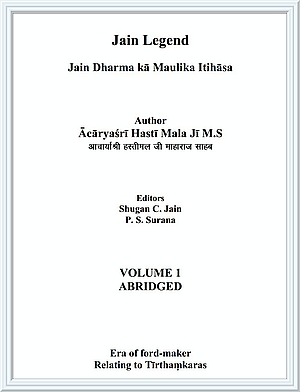Lord Śrī Padmaprabha was the sixth Tīrthaṃkara of Jain religion. He was born in the house of the king of Kauśāmbī. He gained the nāmakarma of Tīrthaṃkara in his previous life as king Aparājita.
Previous Incarnation
King Aparājita ruled over the city of Susīmā. He used to behave in accordance with justice and righteousness. One day, disgusted with worldly things, he accepted the path of perfection (the holy path) at the feet of the monk Pihitāśrava and by veneration of the arihantas and twenty causes / reflections gained the Tīrthaṃkara nāmakarma. At the end of his life, through meditation, after death, he became an excellent god of 31 sāgaras of Graiveyaka.
Birth and Naming
After completing the life-span of a Graiveyaka god, the soul of Aparājita descended from the devaloka into the womb of Susīmā, queen of the king of Kauśāmbī, on the sixth day of the dark half of the Māgha month under the constellation Citrā. The queen saw the 14 auspicious dreams. He was born on the 12th day of the dark fortnight of Kārtika month under Citrā constellation. During pregnancy, queen mother Susīmā had the whim of sleeping on a lotus bed and the child's body reflected the splendor of the lotus. Hence the parents named him Padmaprabha.
Marriage and Initiation
After completing his childhood the moment Padmaprabha became a young man. King Dhara married him off to suitable women. After remaining a young man for 8 lakh pūrvas, Śrī Padmaprabha became king. After ruling for more than 21 lakh pūrvas, realizing how futile are the karmas associated with enjoyment (or worldly things), he became inclined towards the path of salvation. On request by the lokāntika gods after giving charities for a year, he formally took initiation observing a day or two's fast. On the 13th day of the dark fortnight of Kārtika month, at the same time a thousand princes and others took initiation with him.
The next day he broke his fast at Brahmasthala at the house of king Somadeva. The gods showered flowers, etc., to bless the giving (dāna).
Pure knowledge (Omniscience)
After wandering about as a mendicant and observing intense austerities for 6 months he reached Sahasrāmravana. There observing a fast under the Banyan tree, staying fixed in the kāyotsarga (standing, both arms downwards) posture, in deep meditation, he destroyed the obscuring karmas and on the full moon day of Caitra month under Citra constellation, obtained omniscience. Upon obtaining pure knowledge, he gave religious sermon, established the four-fold order and became a Tīrthaṃkara who is the possessor of four infinites (ananta catuṣṭaya), a knower of all the worlds, a visionary and preceptor.
His grand congregation had 107 Gaṇadharas, 12000 omniscient, 10300 telepaths, 10000 clairvoyants, 2300 14-pūrvadhārīs, 16800 vaikriyalabdhidhārīs, 9600 vādīs, 330000 monks, 420000 female-monks, 276000 votaries and 505000 female votaries.
Lord Padmaprabha instructed about the meritorious path for many years after becoming a kevalī. At the end of his life-span, sensing the same, fasting for one month, on the eleventh day of the dark half of Mārgaśīrṣa month under the constellation Citrā, stopping all activities, he became enlightened and liberated. His total life-span was 30 lakh pūrvas of which 6 pūrvāṃgas less of 7-and-a-half pūrvas were spent as a youth, 21-and-a-half lakh pūrvas as king and a little less of a lakh pūrvas as mendicant following the caritra-dharma after which he gained nirvāṇa.
 Acharya Hasti Mala
Acharya Hasti Mala
